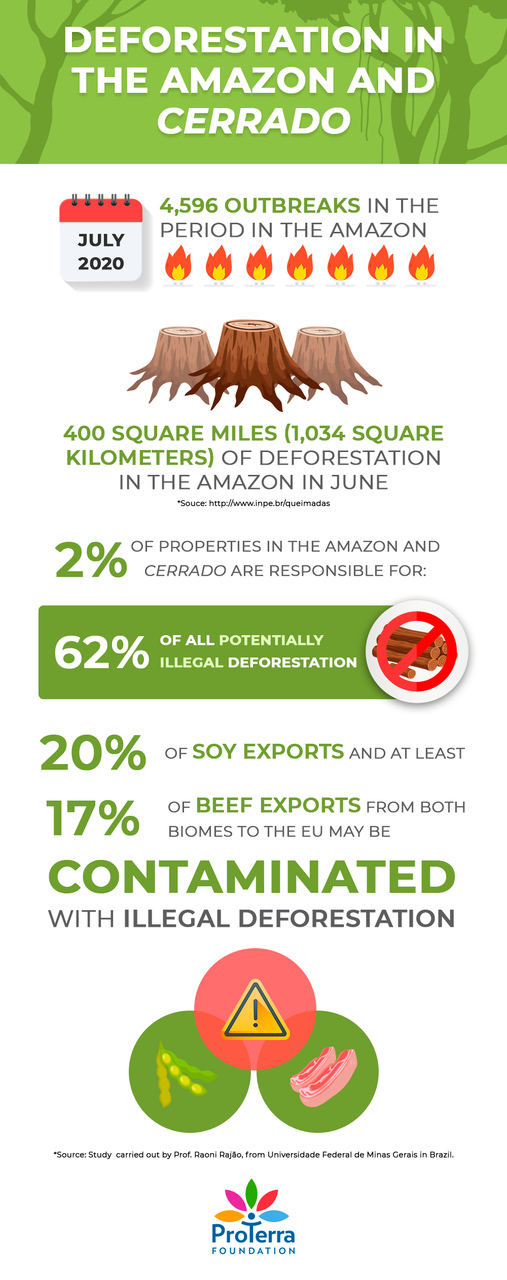ProTerra supports companies to avoid sourcing raw materials within their supply chain connected to land use change
One of ProTerra’s main concern regards to “Biodiversity conservation, effective environmental management and environmental services”, as stated in Principle 4 of its Standard. As deforestation is one of the primary causes of climate change, our aim is to support companies to avoid raw materials within their supply chain connected to land use change.
The Brazilian government has been recently severely criticized internationally due to dismantling of environmental management and increased deforestation in the Amazon and Cerrado areas.
According to INPE (Brazilian National Institute for Space Research)[1], the month of June recorded the largest number of forest fires in the Amazon rainforest, in 13 years, with 4,596 outbreaks in the period. To make things worse, the country has the world’s second-highest coronavirus death toll, after the US, where increased smoke could have a damaging effect on the breathing of virus patients[2]. Besides, recent published figures showed 400 square miles (1,034 square kilometers) of deforestation in the Amazon in June, a new record the month since data started being gathered in 2015.
One of the concerns of international buyers of Brazil’s major agricultural commodities (soy and beef) is that deforestation may have occurred during the process of producing the products. According to a recent study[3] carried out by Prof. Raoni Rajão, from Universidade Federal de Minas Gerais in Brazil, states that “although most of Brazil’s agricultural output is deforestation-free, we find that 2% of properties in the Amazon and Cerrado are responsible for 62% of all potentially illegal deforestation and that roughly 20% of soy exports and at least 17% of beef exports from both biomes to the EU may be contaminated with illegal deforestation”.

This chaotic situation has culminated in two major movements led by several sectors, demanding attitudes from the government:
- CEOs of about 40 companies and groups in the industrial, agricultural and services sectors, in addition to business organizations, both local and multinationals, expressed, in a letter[4], the concern about the poor image of the Brazilian government abroad, demanding urgent actions in the socio-environmental area, mainly in the fight against deforestation in the Amazon and in the other biomes of the country. The letter was sent to the Executive, Legislative and Judiciary, including the Brazilian Vice President and, currently, the president of the National Council of the Legal Amazon, Hamilton Mourão.
- Seventeen ex-finance ministers and ex-presidents of the Central Bank signed a letter entitled “A necessary convergence: towards a low carbon economy”, calling for a resumption of post-pandemic economic growth in the face of climate change and an end to deforestation in the Amazon and the Cerrado. “Overcoming the crisis requires converging around an agenda that allows us to resume economic activities, address social problems and, simultaneously, build a more resilient economy when dealing with climate risks and their implications for Brazil”. The signatories defend integrated criteria for reducing greenhouse gases emissions in the atmosphere and resilience to the climate change impacts and the economic policies. (full text in Portuguese)
After this pressure from businessmen and investors, the Brazilian government published, on July 16th, a decree prohibiting burning in the entire national territory for 120 days, as, historically, the highest incidence of fires in these regions occurs between the months of August and October. The decree was signed by President Jair Bolsonaro and Environment Minister Ricardo Salles [5].
Deforestation is one of the primary causes of climate change
More needs to be done. The ProTerra Standard defines that areas of native vegetation cannot be cleared or converted into agricultural areas, or used for industrial or other commercial purposes, after 2008. Companies that do not comply with this core indicator are automatically excluded as organisations have to meet 80% of all indicators, in which all core indicators are included (100% of core indicators, deforestation belongs in this category).
The ProTerra Foundation will keep promoting responsible practices at all levels of the feed and food production system through its standard and collaboration, helping organizations and producers to implement corporate, social, ethical and environmental policies, contributing towards land conversion-free and sustainable raw material supply chains.
Through implementing the ProTerra Standard, businesses will protect natural eco-systems and adhere to governmental and international regulations. Products certified under ProTerra are sourced from deforestation-free supply chains.


